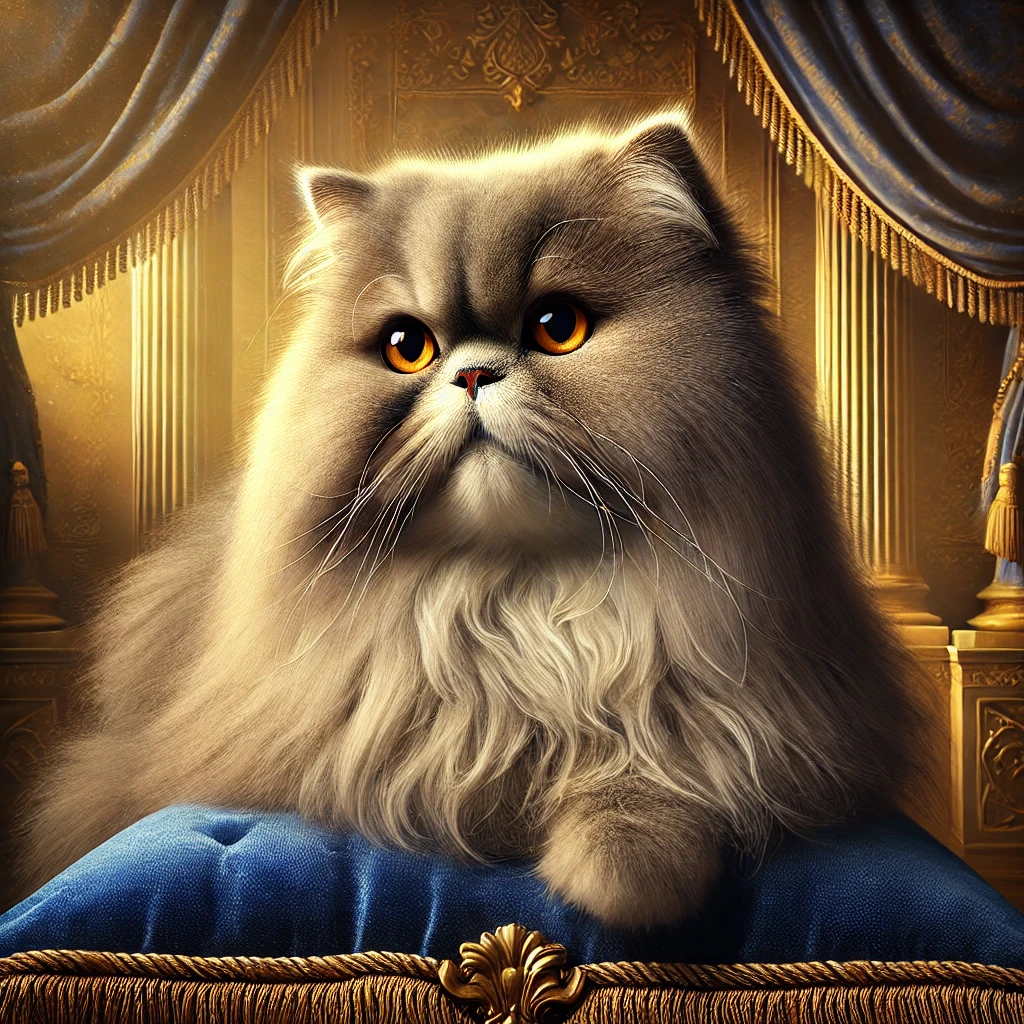Persian cats, often referred to as the “aristocrats of the feline world,” are one of the most beloved and iconic cat breeds. Known for their luxurious, long coats and sweet, gentle demeanor, they have been a popular choice among pet owners for centuries. Their charming appearance and calm personality make them excellent companions.
Table of Contents
History and Origin
The origins of the Persian cat can be traced back to ancient Persia, now modern-day Iran. These cats were introduced to Europe during the 1600s by traders and quickly gained popularity among the European elite. Their long, silky coats and unique facial structure made them highly sought after as exotic pets.
During the Victorian era, Persian cats became a symbol of luxury and sophistication. Breeding programs refined their appearance, enhancing their distinctive features, such as the flat face and thick fur coat. Today, Persian cats are one of the most recognized and loved breeds globally, celebrated for their elegance and affectionate nature.
Unique Features and Characteristics
Persian cats are easily recognizable by their round faces, short noses, and large, expressive eyes. Their thick, dense coats come in a wide range of colors and patterns, including solid, bi-color, and tabby variations. Despite their opulent appearance, Persian cats are known for their laid-back and affectionate temperament. They enjoy spending time with their owners and are often described as lap cats.
However, their luxurious coats require regular maintenance, and they may not be as agile or energetic as some other breeds due to their physique. Persian cats are perfect for those seeking a calm and loving pet that enjoys a serene and cozy environment.

Caring for a Persian Cat
Proper care is crucial to keeping a Persian cat happy and healthy. Due to their specific needs, potential owners must be prepared for the level of attention these elegant felines require.
Grooming Needs
Persian cats have long, dense fur that can easily mat and tangle if not groomed regularly. Daily brushing is recommended to keep their coats healthy and free from knots. Additionally, they are prone to shedding, making frequent grooming sessions necessary to reduce hair accumulation around the home.
Routine bathing is also essential to keep their coats clean and their skin healthy. Owners should use cat-safe shampoos and ensure the fur is thoroughly dried to prevent skin issues. Regular cleaning of their eyes is equally important since their flat faces often lead to tear staining.
Dietary Requirements
Persian cats require a balanced and nutritious diet to maintain their luxurious coat and overall health. High-quality cat food with an appropriate protein-to-fat ratio is essential. Some Persians are prone to being picky eaters, so experimenting with different flavors and textures may be necessary.
Additionally, incorporating omega-3 fatty acids in their diet can promote skin and coat health. Owners should also monitor their cat’s weight closely, as Persian cats can be prone to obesity due to their laid-back lifestyle.
Health Concerns of Persian Cats
Persian cats are prone to specific health issues due to their unique anatomy and genetic predispositions. Knowing these concerns helps owners ensure their pets live a long and comfortable life.

Common Health Issues
Persian cats are brachycephalic, meaning they have a flat face and short nose. While this feature makes them distinctive, it also leads to breathing difficulties, particularly in hot or humid conditions. Some Persians may snore or wheeze due to restricted airways.
They are also prone to polycystic kidney disease (PKD), a hereditary condition that causes cysts to form in the kidneys, potentially leading to kidney failure. Regular veterinary check-ups and genetic testing can help identify and manage this issue.
Eye conditions, including excessive tearing and corneal ulcers, are common in Persians. Their large, expressive eyes are vulnerable to irritation and require routine cleaning to prevent infections.
Preventative Care
Proactive measures are essential for managing a Persian cat’s health. Regular veterinary visits are crucial for early detection of issues like PKD or dental diseases. Vaccinations and parasite control should also be kept up to date.
Owners should invest in a quality diet rich in essential nutrients to bolster their Persian’s overall health. Weight management is vital to avoid obesity, which can exacerbate breathing problems. Additionally, keeping their living environment cool and calm can help mitigate respiratory issues.
Grooming also plays a role in health maintenance. Brushing their fur prevents matting and reduces the risk of skin infections. Cleaning their eyes daily with a damp cloth can help manage tear stains and avoid irritation.
Living with a Persian Cat
Owning a Persian cat is a rewarding experience, but it requires a commitment to meeting their unique needs.
Ideal Home Environment
Persian cats thrive in quiet and serene environments. They prefer a stable routine and are not well-suited for loud or chaotic households. Providing a comfortable, clean space where they can relax is essential. These cats love cozy spots, such as plush beds or sunny windowsills, where they can nap undisturbed.
Persians are indoor cats by nature. Their long coats and flat faces make them ill-suited for outdoor living, where they might encounter extreme weather or harmful elements. Cat-proofing the home ensures their safety and prevents them from accessing dangerous areas.
Social Behavior and Interaction
Persian cats are known for their gentle and affectionate nature. They bond closely with their owners and enjoy spending time in their company. While they are not overly active, they appreciate playtime and interaction, albeit in a calm and relaxed manner.
These cats are excellent with children and other pets, provided they are treated gently. Persians are not aggressive and rarely scratch or bite. However, they may become shy or withdrawn in noisy or overly stimulating environments.
Buying or Adopting a Persian Cat
Choosing a Persian cat involves careful consideration and research to ensure a positive experience for both the owner and the pet.

Where to Buy or Adopt
Prospective owners can acquire Persian cats from reputable breeders or adopt them from rescue organizations. It’s essential to verify the breeder’s credentials to ensure they follow ethical breeding practices. Reputable breeders provide health certificates and offer a supportive environment for their cats.
Adopting from shelters or breed-specific rescues is an alternative for those who wish to give a Persian cat a second chance. Adoption fees are generally lower than purchasing from a breeder, and many rescue organizations provide thorough health checks.
What to Look for When Choosing a Persian Cat
When selecting a Persian cat, evaluate its health and temperament. Look for signs of a clean, well-groomed coat, bright eyes, and alert behavior. Avoid cats showing signs of respiratory distress, lethargy, or unkempt fur.
It’s also essential to consider the cat’s age and whether you’re ready for the demands of a kitten or prefer the stability of an adult Persian. Kittens require more training and patience, while older cats are often calmer and more predictable.
Q&A Section
Common Questions About Persian Cats
Q: How much grooming does a Persian cat need?
A: Persian cats require daily grooming to keep their coats free of tangles and mats. Routine baths every few weeks are also recommended.
Q: Are Persian cats good with children?
A: Yes, Persian cats are generally good with children. Their calm demeanor makes them patient companions, but it’s essential to teach kids to handle them gently.
Q: Do Persian cats have special dietary needs?
A: While they don’t have specific dietary needs, a high-quality, balanced diet is crucial to maintaining their health and luxurious coat.
Conclusion
Persian cats are a beautiful and affectionate breed, known for their regal appearance and loving temperament. They require dedicated care, including regular grooming, a nutritious diet, and a calm environment to thrive. For those willing to invest the time and effort, Persian cats make loyal and delightful companions. Whether adopting or purchasing, bringing a Persian into your life is a decision filled with love and companionship.



